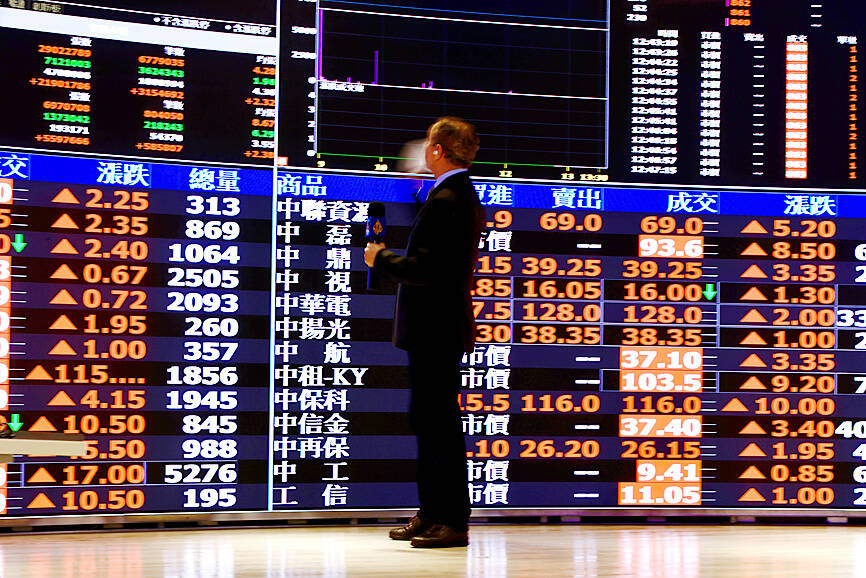Taiwanese stocks surged 9.25 percent yesterday after US President Donald Trump overnight announced a 90-day pause on his “reciprocal” tariffs for most countries, easing investor fears and fueling a global rebound.
The TAIEX opened sharply, soaring 1,615.09 points to 19,006.85, then stabilized as many stocks hit their daily 10 percent limit, capping further gains and keeping turnover on the main board modest at NT$197.494 billion (US$6.01 billion).
Heavyweight stocks Taiwan Semiconductor Manufacturing Co (台積電), Hon Hai Precision Industry Co (鴻海精密), and MediaTek Inc (聯發科) surged by their 10 percent daily limit, leading a market-wide rally as investor sentiment rebounded. The New Taiwan dollar also strengthened by as much as 0.6 percent against the US dollar — its biggest intraday jump since November last year.

Photo: RITCHIE B. TONGO, EPA-EFE
In total, 1,389 of the more than 1,870 listed companies on the Taiwan Stock Exchange and Taipei Exchange hit their limit-up prices during the session, exchange data showed.
The sharp rebound followed a three-day sell-off that had dragged the TAIEX into a bear market and saw traders rushing to reverse leveraged bets.
Analysts said the rally provided much-needed relief for battered tech stocks and helped ease concerns following recent volatility.
Elsewhere in Asia, Japan’s Nikkei 225 jumped more than 9 percent, Australia’s S&P/ASX 200 soared 4.5 percent and South Korea’s KOSPI gained 6.6 percent. Hong Kong’s Hang Seng index also added 2.1 percent and the Shanghai Composite index rose 1.2 percent.
European markets also surged in early trading, with Germany’s DAX gaining 5.3 percent, while France’s CAC 40 in Paris rose 5 percent and the UK’s FTSE 100 surged 4.0 percent.
In Taiwan, the government moved swiftly to stabilize the market following recent turbulence. In addition to tightening short-selling rules and increasing margin requirements, the Ministry of Finance on Tuesday authorized the activation of the NT$500 billion National Stabilization Fund (國安基金) to support the market.
Minister of Finance Chuang Tsui-yun (莊翠雲) yesterday said the ministry is assessing whether to expand the stabilization fund amid fallout from Trump’s tariff policy.
Chuang made the remarks at a meeting of the legislature’s Finance Committee where Democratic Progressive Party Legislator Kuo Kuo-wen (郭國文) asked whether the stabilization fund’s current resources would prove sufficient given the scale of market turmoil.
Chuang said there are early signs that the market is beginning to stabilize, adding that the ministry is assessing whether to raise the authorized amount of NT$500 billion to help ease market volatility if circumstances warrant such a move.

Taiwan is projected to lose a working-age population of about 6.67 million people in two waves of retirement in the coming years, as the nation confronts accelerating demographic decline and a shortage of younger workers to take their place, the Ministry of the Interior said. Taiwan experienced its largest baby boom between 1958 and 1966, when the population grew by 3.78 million, followed by a second surge of 2.89 million between 1976 and 1982, ministry data showed. In 2023, the first of those baby boom generations — those born in the late 1950s and early 1960s — began to enter retirement, triggering

ECONOMIC BOOST: Should the more than 23 million people eligible for the NT$10,000 handouts spend them the same way as in 2023, GDP could rise 0.5 percent, an official said Universal cash handouts of NT$10,000 (US$330) are to be disbursed late next month at the earliest — including to permanent residents and foreign residents married to Taiwanese — pending legislative approval, the Ministry of Finance said yesterday. The Executive Yuan yesterday approved the Special Act for Strengthening Economic, Social and National Security Resilience in Response to International Circumstances (因應國際情勢強化經濟社會及民生國安韌性特別條例). The NT$550 billion special budget includes NT$236 billion for the cash handouts, plus an additional NT$20 billion set aside as reserve funds, expected to be used to support industries. Handouts might begin one month after the bill is promulgated and would be completed within

One of two tropical depressions that formed off Taiwan yesterday morning could turn into a moderate typhoon by the weekend, the Central Weather Administration (CWA) said yesterday. Tropical Depression No. 21 formed at 8am about 1,850km off the southeast coast, CWA forecaster Lee Meng-hsuan (李孟軒) said. The weather system is expected to move northwest as it builds momentum, possibly intensifying this weekend into a typhoon, which would be called Mitag, Lee said. The radius of the storm is expected to reach almost 200km, she said. It is forecast to approach the southeast of Taiwan on Monday next week and pass through the Bashi Channel

NO CHANGE: The TRA makes clear that the US does not consider the status of Taiwan to have been determined by WWII-era documents, a former AIT deputy director said The American Institute in Taiwan’s (AIT) comments that World War-II era documents do not determine Taiwan’s political status accurately conveyed the US’ stance, the US Department of State said. An AIT spokesperson on Saturday said that a Chinese official mischaracterized World War II-era documents as stating that Taiwan was ceded to the China. The remarks from the US’ de facto embassy in Taiwan drew criticism from the Ma Ying-jeou Foundation, whose director said the comments put Taiwan in danger. The Chinese-language United Daily News yesterday reported that a US State Department spokesperson confirmed the AIT’s position. They added that the US would continue to